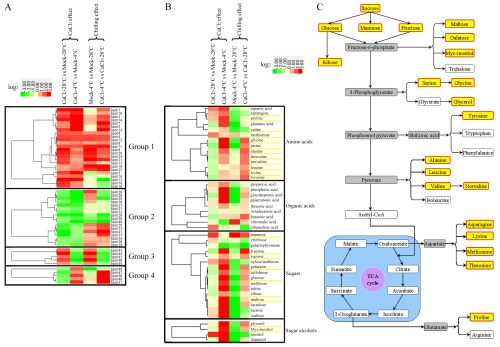Physiological and Metabolic Mechanisms of Ca2+ Improve Cold Stress Tolerance in Bermudagrass
2014-02-17
Bermudagrass (Cynodon dactylon (L). Pers.), a warm-season turfgrass, is cultivated in warm climates all over the world, but it doesn’t grow well under chilling and freezing stress conditions, therefore, improving chilling and freezing tolerances is very important for grass engineering, especially for warm-season turfgrass. However, all these mechanisms of chilling and freezing stress responses were extensively dissected in model plants like Arabidopsis. The detailed changes in turfgrass especially burmudagrass at both protein and metabolite levels remain obscure. As an important second messenger, calcium is involved in plant cold stress response, including chilling (<20℃ and freezing (<0 ℃). In bermudagrass, components of calcium signaling pathway have not been identified because of the limited genome information.
Dr. SHI Haitao, under the supervision of Prof. CHAN Zhulong from Wuhan Botanical Garden, performed comparative proteomic and metabolomic analysis to reveal mechanisms of improved cold stress tolerance in bermudagrass (Cynodon dactylon (L). Pers.) by exogenous calcium.
Exogenous application of calcium chloride (CaCl2) improved both chilling and freezing stress tolerances, while ethylene glycol-bis-(β-aminoethyl) ether-N, N, N, N-tetraacetic acid (EGTA) reversed CaCl2 effects in bermudagrass (Cynodon dactylon (L). Pers.). Physiological analyses showed that CaCl2 treatment alleviated the reactive oxygen species (ROS) burst and cell damage triggered by chilling stress, via activating antioxidant enzymes, non-enzymatic glutathione antioxidant pool, while EGTA treatment had the opposite effects.
Additionally, comparative proteomic analysis identified 51 differentially expressed proteins that were enriched in redox, tricarboxylicacid (TCA) cycle, glycolysis, photosynthesis (PS), oxidative pentose phosphate pathway (OPP) and amino acid metabolisms. Consistently, 42 metabolites including amino acids, organic acids, sugars and sugar alcohols were regulated by CaCl2 treatment under control and cold stress conditions, further confirming the common modulation of CaCl2 treatment in carbon metabolites and amino acid metabolism.
This study reported first evidence of the essential and protective roles of endogenous and exogenous calcium in bermudagrass response to cold stress, partially via activation of the antioxidants and modulation of several differentially expressed proteins and metabolic homeostasis in the process of cold-acclimation.
Results were published in Journal of Integrative Plant Biology (doi: 10.1111/jipb.12167) online entitled “Comparative proteomic and metabolomic analyses reveal mechanisms of improved cold stress tolerance in bermudagrass (Cynodon dactylon(L). Pers.) by exogenous calcium”.

Hierarchical cluster analysis of fold change of differentially expressed protein spots by CaCl2 treatment under control and cold stress conditions (A); Effects of exogenous CaCl2 on metabolites under control and cold stress conditions in bermudagrass (B, C) (Image by WBG)